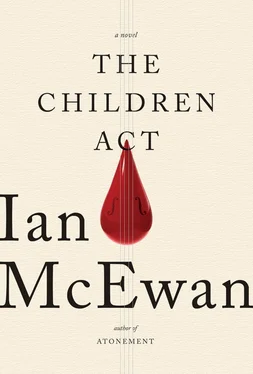“I’ll tell you why I’m here, Adam. I want to be sure you know what you’re doing. Some people think you’re too young to be taking a decision like this and that you’ve been influenced by your parents and the elders. And others think you’re extremely clever and capable and we should just let you get on with it.”
In the harsh light he rose so vividly before her, the untidy black hair curling over the neckline of his gown, the large dark eyes scanning her face in restless saccades, alert for any deception or false notes. From the bedclothes she caught the scent of talcum powder or soap, and on his breath something thin and metallic. His diet of drugs.
“Well,” he said eagerly. “What’s your impression so far? How am I doing?”
He was playing her, all right, drawing her back onto other ground, to a wilder space where he could dance round her, tempt her to say something inappropriate and interesting again. It occurred to her that this intellectually precocious young fellow was simply bored, understimulated, and that by threatening his own life he had set in motion a fascinating drama in which he starred in every scene, and which had brought to his bedside a parade of important and importuning adults. If this was so, she liked him all the more. Serious illness could not smother his vitality.
So, how was he doing? “Pretty well, so far,” she said, aware she was taking a risk. “You give the impression of someone who knows his own mind.”
“Thank you,” he said in a voice derisively sweet.
“But it might just be an impression.”
“I like to make a good impression.”
His manner, his humor, had an element of the silliness that can accompany high intelligence. And it was self-protective. He was surely very frightened. It was time to talk him down.
“And if you know your own mind, you won’t object to discussing practicalities.”
“Fire away.”
“The consultant says that if he could transfuse you and raise your blood count he could add two very effective drugs to your treatment and you’d have a good chance of a complete and fairly quick recovery.”
“Yes.”
“And without a transfusion you could die. You understand that.”
“Yup.”
“And there’s another possibility. I need to be sure you’ve considered it. Not death, Adam, but a partial recovery. You could lose your sight, you could suffer brain damage or your kidneys could go. Would it please God to have you blind or stupid and on dialysis for the rest of your life?”
Her question overstepped the mark, the legal mark. She glanced across to where Marina sat in her shadowy corner. She was using the magazine to support a notebook and was writing by feel alone. She did not look up.
Adam was staring at a space over Fiona’s head. With a wet clicking sound he moistened his lips with a white-coated tongue. Now there was sulkiness in his tone.
“If you don’t believe in God you shouldn’t be talking about what does or doesn’t please him.”
“I haven’t said I don’t believe. I’d like to know whether you’ve considered this carefully, that you may be ill and disabled, mentally, physically or both, for the rest of your life.”
“I’d hate it, I’d hate it.” He turned from her quickly in the attempt to conceal the tears that had suddenly formed. “But if that’s what happens I have to accept it.”
He was upset, holding his gaze well away from her, ashamed that she could see how easy it had been to deflate his bumptiousness. His elbow, slightly crooked, looked pointed and fragile. Irrelevantly, she thought of recipes, roast chicken with butter, tarragon and lemon, aubergines baked with tomatoes and garlic, potatoes lightly roasted in olive oil. Take this boy home and feed him up.
They had made useful progress, reached a new stage, and she was about to follow up with another question when the Caribbean nurse came in and held the door wide open. Outside, as though summoned by her fantasy cuisine, was a young man in a brown cotton jacket, barely older than Adam, standing by a trolley of brushed steel containers.
“I can send your dinner away,” the nurse said. “But only for half an hour.”
“If you can bear it,” Fiona said to Adam.
“I can bear it.”
She got up from her chair to allow the nurse to make her routine check on her patient and the monitors. She must have registered his emotional state and seen the wetness around his eyes, for she wiped his cheek with her hand just before she left and whispered loudly, “You listen carefully to what this lady has to say.”
The interruption had altered the mood in the room. When Fiona was back in her chair she didn’t return to her intended question. Instead she nodded toward the sheets of paper among the debris on the bed. “I hear you’ve been writing poetry.”
She had expected him to reject the prompt as intrusive or condescending, but he seemed relieved to be diverted and she thought his manner was sincere, completely undefended. She also noted how quickly his mood shifted.
“I’ve just finished something. I could read it if you want. It’s really short. But wait a minute.” He rolled onto his side to face her directly. Before speaking he wetted his dried lips. Again, the creamy white tongue. In another context it might have been beautiful, a cosmetic novelty.
He said confidingly, “What do they call you in court? Is it ‘Your Honor’?”
“Usually it’s ‘My Lady.’”
“My Lady? That’s fantastic! Am I allowed to call you that?”
“Fiona will do.”
“But I want to call you My Lady. Please let me.”
“All right. What about this poem?”
He leaned back against the pillows to get his breath back and she waited. Reaching forward at last for a sheet of paper near his knee brought on a round of enfeebled coughing. When that was done his voice was thin and husky. She heard no irony in the way he now addressed her.
“The weird thing, My Lady, is that I didn’t start writing my best poetry until I got ill. Why do you think that is?”
“You tell me.”
He shrugged. “I like writing in the middle of the night. The whole building shuts down and all you can hear is this strange deep hum. You can’t hear it in the day. Listen.”
They listened. Outside, there were still another four hours of light and rush hour was peaking. In here it was the dead of night, but she could hear no hum. She was coming to realize that his defining quality was innocence, a fresh and excitable innocence, a childlike openness that may have had something to do with the enclosed nature of the sect. The congregation, so she had read, was encouraged to keep their children apart as far as was possible from outsiders. Rather like the ultra-Orthodox Jews. Her own teenage relatives, girls as well as boys, had all too soon protected themselves with a sheen of knowing toughness. Their overstated cool was charming in its way, a necessary bridge to adulthood. Adam’s unworldliness made him endearing, but vulnerable. She was touched by his delicacy, by the way he stared fiercely at his sheet of paper, perhaps trying to hear in advance his poem through her ears. She decided that he was probably much loved at home.
He glanced at her, drew breath and began.
My fortunes sank into the darkest hole
When Satan took his hammer to my soul.
His blacksmith’s strokes were long and slow
And I was low.
But Satan made a cloth of beaten gold
That shone God’s love upon the fold.
The way with golden light is paved
And I am saved.
She waited in case there was more but he put the page down, leaned back and looked at the ceiling as he spoke.
“I wrote it after one of the elders, Mr. Crosby, told me that if the worst was to happen, it would have a fantastic effect on everyone.”
Читать дальше












